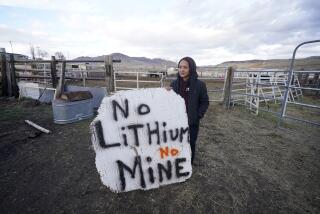Indian Miners Struggle for Compensation
SHIPROCK, N.M. — Joe Kee Nez worked in mines deep below the Colorado Plateau for three decades, running a drill that gouged soft yellow uranium ore out of the rock.
The uranium that Nez and thousands of other American Indians dug from the earth went into nuclear warheads credited with helping America win the Cold War.
But many of the miners themselves have become Cold War casualties--dead or dying from cancer and other ailments blamed on exposure to radiation in the mines.
“I lost two brothers who worked in the mine. Somehow I survived,” Nez said in Navajo as he sat in the living room of his mobile home on a hill opposite a huge pile of waste from the uranium mills.
Nez is dying too.
His arm bears a web of scars from dialysis treatments, needed for failed kidneys Nez blames on drinking radioactive water in the mines. He gestures with thick-fingered miner’s hands to the right side of his chest.
“My lung on this side is bad,” Nez said. “I went to Albuquerque to get chest X-rays, and the doctors explained it and told me I was affected with uranium--lung cancer.”
Congress passed the Radiation Exposure Compensation Act in 1990 to help uranium miners and others who suffered because of America’s nuclear weapons program. The law provides $100,000 to each underground uranium miner who has one of six lung diseases linked to radiation exposure.
But Nez and hundreds of other Indian uranium miners haven’t seen a penny.
The compensation law sets up nearly impossible hurdles for Indian miners, former miners say. The first step is one of the most difficult--filling out paperwork written in English, a language many Indians don’t understand well.
More than 2,700 former miners and their relatives have registered with the tribe’s Office of Navajo Uranium Workers, director Leroy Esplain said.
Of 242 miners who have applied for compensation through the Navajo office since 1995, 96 have been approved. Overall, the Justice Department has approved 1,314 claims from former uranium miners and denied 1,316 claims.
The check stubs and other documentation needed to prove someone worked in a mine are “very difficult and sometimes impossible to obtain,” Esplain said.
Jerry Fischer, who runs the radiation compensation program at the Justice Department, concedes the application process can be difficult. Most unsuccessful claims are rejected because the miners either did not work underground or were not exposed to enough radiation, he said.
Tribal officials and former miners plan to lobby Congress this fall for changes in the compensation law making it easier for former miners to get payments.
“All the Navajo miners, everybody thinks that they should get compensation not based on anything else but their work in the mines, period,” Benally said.
More to Read
Sign up for Essential California
The most important California stories and recommendations in your inbox every morning.
You may occasionally receive promotional content from the Los Angeles Times.










